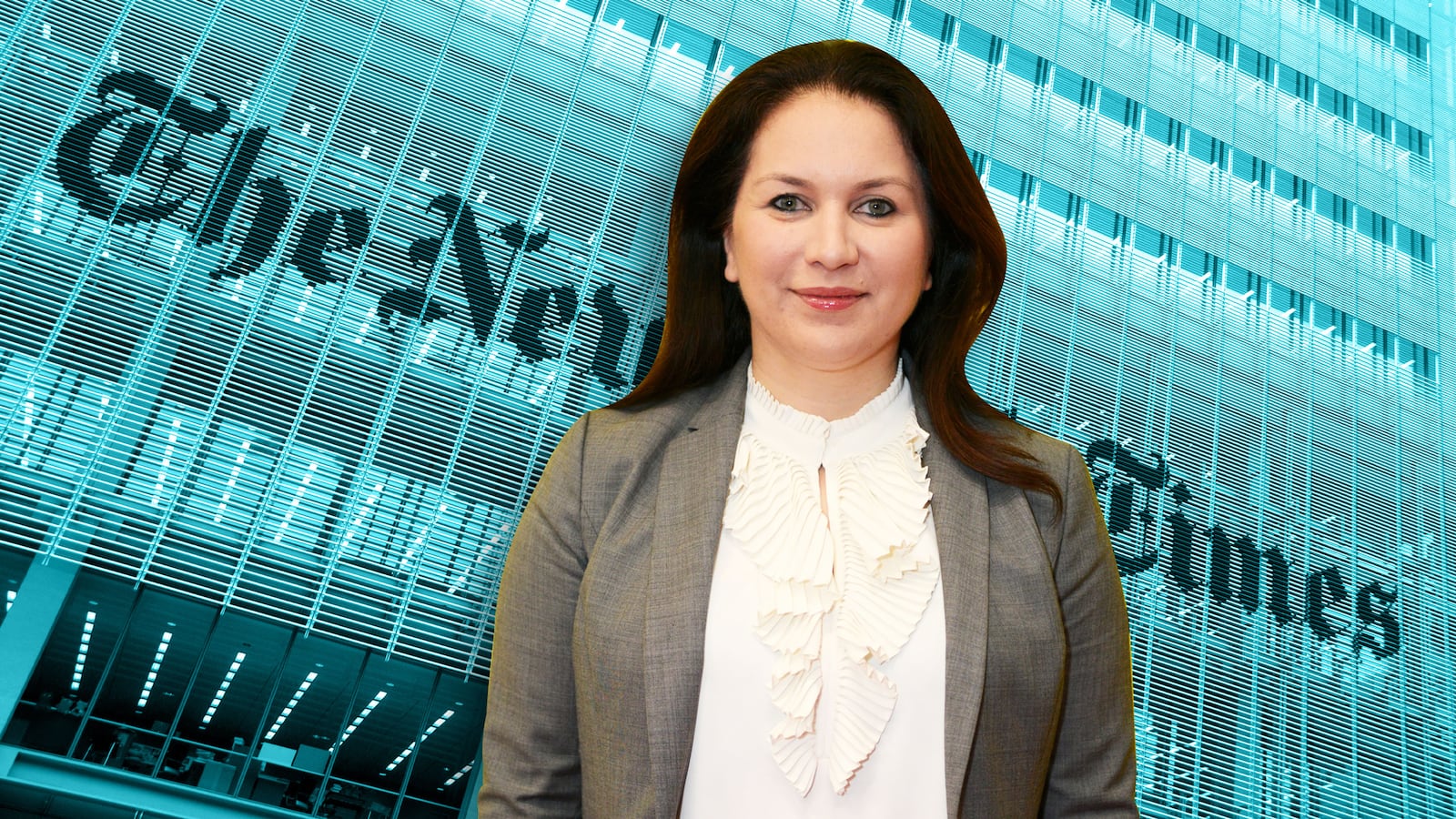The future of star New York Times reporter Rukmini Callimachi hangs in the balance as multiple internal investigations into her body of work have uncovered potentially damaging emails and evidence of further flaws in her reporting and in the paper’s editorial process, people familiar with the probe told The Daily Beast.
Over the course of the last several months, the Times has delved deep into the scandal that has jeopardized one of the paper’s most high-profile and successful long-term reporting projects of recent years.
In October, Canadian authorities arrested 25-year-old Abu Huzayfah, saying he posed as a member of ISIS and lied about traveling to Syria to join the organization in 2014. While Huzayfah’s alleged hoax may have gone unnoticed by the wider public if they’d remained relegated to the dark corners of the extremist internet, the arrest made international news because he had been the primary voice of the Times’ critically acclaimed, ISIS-focused podcast Caliphate, hosted by Callimachi, a Pulitzer finalist and correspondent for the newspaper.
The arrest and subsequent allegations that his story was fabricated made waves at the paper, and immediately brought scrutiny upon Callimachi’s body of work. As other outlets, including the Times itself reported, top figures at the newspaper are now in the midst of two simultaneous investigations into the fallout of the charges that Huzayfah—whose real name is Shehroze Chaudhry—perpetrated a terrorist hoax, and never visited the Middle East as he claimed on the show and in interviews.
Following the arrest, the paper of record deployed two-time Pulitzer prize-winner Mark Mazzetti to Canada to re-report Caliphate, with one of the major questions to determine is whether Huzayfah ever traveled to Syria to join ISIS.
A separate internal probe, led by Dean Murphy, the paper’s associate managing editor for investigations, has pursued a much broader range of concerns surrounding Callimachi’s other previous reporting, and whether that work also contained flaws.
Under Murphy’s purview, Charlotte Behrendt, an assistant managing editor, and Susan Wessling, the deputy editor of standards, have been conducting interviews with staffers and others outside the paper who have been involved with Callimachi. Sources who have spoken to investigators say they have been working overtime on the weekends, and have attempted to keep participants siloed off from each other by urging them not to share investigator questions and their own answers with Times colleagues.
Behrendt, a lawyer for the paper who is a part of the news division, has risen through the ranks over the past several years, and has been involved in high-profile internal probes of alleged employee misconduct and wrongdoing. In 2018, Behrendt was part of the team that looked into a bizarre saga in which Callimachi said the then-Baghdad bureau chief, Margaret Coker, had attempted to collude with the Iraqi government to block her from entering the country.
A spokesperson for the Times told The Daily Beast: “Our review is in its final stages and we will have more to say when that process is completed.”
According to multiple people familiar with the matter, the current probe has already interviewed dozens of Times staffers and others, many of whom have raised concerns about much of the information contained in previous reports including by The Daily Beast and the Times itself.
One of the stories investigators have spent a great deal of time reviewing is that of Louai Abo Aljoud, a Syrian journalist profiled by Callimachi in 2014 who claimed he was imprisoned by militants, and said he saw western prisoners including James Foley, the journalist taken hostage and beheaded by ISIS in 2014. That story had already been corrected and then re-reported by Tim Arango, the former Times bureau chief in Baghdad.
Multiple people familiar with the matter told The Daily Beast that investigators have also heard concerns from Times journalists about how Callimachi has presented herself to sources.
The investigators have also turned up damning emails—dating back several years—that purportedly show Times staffers raising red flags about Callimachi’s reporting, people familiar with the matter said.
Perhaps alarmingly for Times top brass, the investigators have also raised questions about editorial decisions made by current managing editor Joseph Kahn. Considered a favorite to succeed Executive Editor Dean Baquet, Kahn is known to have promoted Callimachi and vigorously defended her from critics and skeptics, both internally and externally. And as a foreign editor when Callimachi joined the paper, Kahn had been informed of serious issues with Callimachi’s work, including the Abo Aljoud story, by James Foley’s brother Michael—in a letter sent in 2015.
“I would also like to bring to your attention, the extreme unprofessionalism and threats Rukmini directed to a grieving family only days after Jim’s horrific and public execution. On 2 occasions by phone, starting on Aug. 22nd, Rukmini threatened to publish a detailed torture story if I did not comply with her interview request,” read Michael’s letter.
Within the paper of record, numerous journalists have continued to press top editors about the findings of the investigation which those interviewed said appear damning and call into question the future of Callimachi—who has not had a byline since Sept. 29—at The New York Times.
Several employees shared with The Daily Beast that they felt that the continued pressure was important to ensure the Times held itself accountable, despite some concerns from reporters about the newsroom’s decision to investigate itself.
The Times had previously defended Callimachi’s work with a spokesperson saying, “Rukmini is a brave and talented reporter whose body of work has shed new light on how ISIS functioned, attracted recruits, and stayed in power.”
In a staff-wide town hall meeting last week, Baquet noted the paper had received several questions from employees about the status of the investigations, which he reiterated were ongoing, and said he would share the results when they concluded.
Michael Foley, who had previously met with Kahn and raised concerns about Callimachi’s work, told The Daily Beast that while he has not been contacted by investigators he hopes the probe holds to account not just the star reporter but also her editors.
“I hope the truth comes to light. [Callimachi] wasn’t professional and the management team her supervisory team was given a direct account which refuted her published article and did nothing about it,” he said.
“Isn’t that the role of an editor? If they are not doing that what else do you do. They should have to answer for it,” Foley continued. “I got on a plane and flew down there for it and it was really just dismissed. I gave them every opportunity. All I wanted was a simple correction. If they had just made that correction I would’ve been satisfied. There was an arrogance there.”
—With additional reporting by Adam Rawnsley. This piece has been updated.








